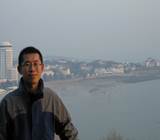|
|
Name:(姓名)Tifeng Shan
Title:(职称)Associate professor
Subject:(专业)Marine Biology
Tel/Fax:(电话/传真)0532-82893661
E-mail:(电邮)shantifeng@qdio.ac.cn
Address:(通信地址)7 Nanhai Road, Qingdao, China
More:(其它如职务、所属实验室、个人网站链接等)
Resume:(个人简历,总结性叙述)
2014. 11-2015.03, Visiting professor, Hokkaido University, Japan
2013.01-present, Associate professor, Institute of Oceanology, Chinese Academy of Sciences
2009. 07-2012.12, Assistant professor, Institute of Oceanology, Chinese Academy of Sciences
Education:(教育经历)
Ph.D, 2009, Institute of Oceanology, Chinese Academy of Sciences
Professional Memberships:(组织任职)
Research Interests:(研究领域)
Macroalgal cultivation, breeding, genetics
Academic Achievements:(科研成果)
Honors and Awards:(获得荣誉、获奖情况)
Selected Publications:(发表论文、出版书籍)
(1) Shan T, Yuan J, Su L, Li J, Leng X, Zhang Y, Gao H, Pang S (2020) First Genome of the Brown Alga Undaria pinnatifida: Chromosome-Level Assembly Using PacBio and Hi-C Technologies. Frontiers in Genetics 11:140.
(2) Shan T, Li Q, Wang X, Pang S (2020) Full-length transcriptome sequencing and comparative transcriptomic analysis of different developmental stages of the sporophyll in Undaria pinnatifida (Laminariales: Alariaceae). J Appl Phycol. 32:2081-2092
(3) Shan T, Li Q, Wang X, Su L, Pang S (2019) Assessment of the genetic connectivity between farmed populations on a typical kelp farm and adjacent spontaneous populations of Saccharina japonica (Phaeophyceae, Laminariales) in China. Frontiers in Marine Science 6:494
(4) Shan TF, Pang SJ, Wang XM, Li J, Su L, Schiller J, Lackschewitz D, Hall- Spencer JM, Bischof K (2019) Genetic analysis of a recently established Undaria pinnatifida (Laminariales: Alariaceae) population in the northern Wadden Sea reveals close proximity between drifting thalli and the attached population. Eur J Phycol 54 (2):154-161.
(5) Shan T, Pang S, Wang X, Li J, Su L (2018) Assessment of the genetic connectivity between farmed and wild populations of Undaria pinnatifida (Phaeophyceae) in a representative traditional farming region of China by using newly developed microsatellite markers. J Appl Phycol 30 (4):2707-2714.
(6) Shan T, Yotsukura N, Pang S (2017) Novel implications on the genetic structure of representative populations of Saccharina japonica (Phaeophyceae) in the Northwest Pacific as revealed by highly polymorphic microsatellite markers. J Appl Phycol 29:631–638
(7) Shan TF, Pang SJ, Li J, Gao SQ (2016) Breeding of an elite cultivar Haibao No. 1 of Undaria pinnatifida (Phaeophyceae) through gametophyte clone crossing and consecutive selection. J Appl Phycol 28:2419–2426
(8) Shan T, Pang S, Li J, Li X, Su L (2015) Construction of a high-density genetic map and mapping of a sex-linked locus for the brown alga Undaria pinnatifida (Phaeophyceae) based on large scale marker development by specific length amplified fragment (SLAF) sequencing. BMC Genomics 16:902.
(9) Shan T, Pang S, Li J, Li X (2015) De novo transcriptome analysis of the gametophyte of Undaria pinnatifida (Phaeophyceae). J Appl Phycol 27 (2):1011-1019.
(10) Shan T, Pang S, Li J, Su L (2015) Isolation and characterization of eight novel microsatellite loci from the brown alga Sargassum horneri. J Appl Phycol 27 (6):2419-2421.
(11) Shan TF, Pang SJ, Gao SQ (2013) Novel means for variety breeding and sporeling production in the brown seaweed Undaria pinnatifida (Phaeophyceae): Crossing female gametophytes from parthenosporophytes with male gametophyte clones. Phycol Res 61 (2):154-161.
(12) Shan T, Pang S, Liu F, Xu N, Zhao X, Gao S (2012) High genetic diversity in gametophyte clones of Undaria pinnatifida from Vladivostok, Dalian and Qingdao revealed using microsatellite analysis. Chin J Oceanol Limnol 30 (2):225-230.
(13) Shan TF, Pang SJ, Zhang YR, Yakovleva IM, Skriptsova AV (2011) An AFLP-based survey of genetic diversity and relationships of major farmed cultivars and geographically isolated wild populations of Saccharina japonica (Phaeophyta) along the northwest coasts of the Pacific. J Appl Phycol 23 (1):35-45.
(14) Shan T, Pang S, Gao S (2011) Periodic exposure to ambient solar irradiance benefits the growth of juvenile seedlings of Hizikia fusiformis. Chin J Oceanol Limnol 29 (5):1009-1014.
(15) Shan TF, Pang SJ (2010) Sex-linked microsatellite marker detected in the female gametophytes of Undaria pinnatifida (Phaeophyta). Phycol Res 58 (3):171-176.
(16) Shan TF, Pang SJ (2009) Assessing genetic identity of sporophytic offspring of the brown alga Undaria pinnatifida derived from mono-crossing of gametophyte clones by use of amplified fragment length polymorphism and microsatellite markers. Phycol Res 57 (1):36-44.
(17) Su L, Shan T, Pang S, Li J (2018) Analyses of the genetic structure of Sargassum horneri in the Yellow Sea: implications of the temporal and spatial relations among floating and benthic populations. J Appl Phycol 30 (2):1417-1424.
(18) Wang X, Shan T, Pang S (2018) Phytoremediation potential of Saccharina japonica and Sargassum horneri (Phaeophyceae): Biosorption study of strontium. Bull Environ Contam Toxicol 101 (4):501-505.
(19) Wang X, Shan T, Pang S (2019) Effects of Cobalt on Spore Germination, Gametophyte Growth and Gametogenesis of Undaria pinnatifida (Phaeophyceae). Bull Environ Contam Toxicol 102 (6):784-788.
(20) Wang X, Shan T, Pang S, Su L (2019) Assessment of the genetic relationship between the recently established benthic population and the adjacent floating populations of Sargassum horneri (Phaeophyceae) in Dalian of China by newly developed trinucleotide microsatellite markers. J Appl Phycol. doi:10.1007/s10811-019-01853-2
(21) Su L, Shan TF, Li J, Pang SJ, Leng XF, Zhang Y, Gao HT (2020) Aquaculture of the hybrid cultivars of Saccharina japonica: Removing the obstacle of sori production by photoperiodic control. Aquaculture 519:734917
(22) Zhang Y, Wang X, Shan T, Pang S, Xu N (2019) Transcriptome profiling of the meristem tissue of Saccharina japonica (Phaeophyceae, Laminariales) under severe stress of copper. Mar Genomics. doi:10.1016/j.margen.2019.03.006
|
|

Address: 7 Nanhai Road, Qingdao, Shandong 266071, China
Tel: 86-532-82898902 Fax: 86-532-82898612 E-mail: iocas@qdio.ac.cn



